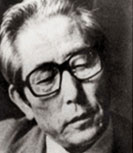
Yu Seung-gyu
(1921~1993)
Yu Seung-gyu (1921 ~ 1993) Novelist. Born on January 1, 1921 in Chuso-li, Gunbuk-myeon, Okcheon-gun.
His gwanhyang (birthplace of his family founder) is Munhwa and his real name is Jaeman. In 1956, by recommendation of master Lee Mu-young, he entered the literary world with his first work published in a journal called <Jayoomunhak>. He concentrated on creating more than 150 works, that deal with disadvantages in agricultural life and industry, including <Binnong> <Doodugji> <Ajukari> <Neutinamu> <Gulyokilgi> <Aehyanggok> <Pureunbul>. He portrayed underprivileged farmers' resentment, social discrepancies and a farmer's struggles thorough Japanese occupancy of Korea.
For 20 years, Yu Seung-gyu was a farmer himself, and this experience thus gave him a real sense of suffering, poverty and repression. As such, apart from other writers' works, his works explicitly relate the poverty in agricultural life to the suffering in our nation, making it a socially urgent issue. Yu Seung-gyu felt agricultural community to be the most unappreciated economic group in the country and worked without any lyricism on this issue.
After finishing his life-long novel, <Dukuhmuhri> in his hometown, on September 16, 1993, he left the place to live quietly on a lakeside in Chuso-li.
The writer of soil, Yu Seung-gyu was awarded from Literary Award of Soil, The 1st Korean Agricultural Literary Award, and Okcheon Literary Award, and left behind various works like <Nongki>, <Nongji>, <Chumchuneun Sanha-dancing nature>, <Heulgeun Salaitda-soil is alive>, and <Ikuhganeun Podosongi-riping grapes>.